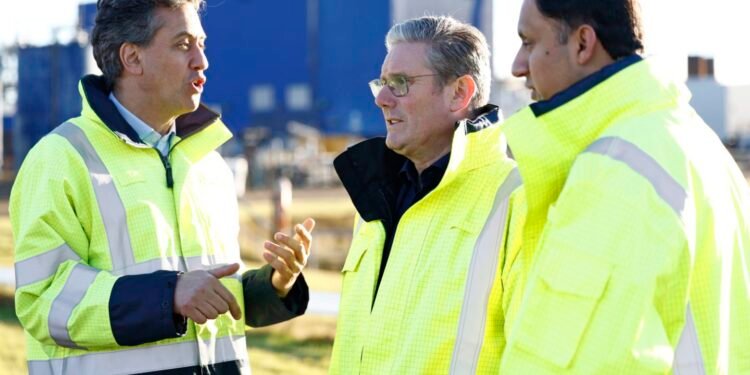With growing geopolitical unrest, and headwinds in renewables, future energy policy should recognise the vital role that oil and gas will continue to play, writes Jon Fitzpatrick, founder and managing director of Gneiss Energy.
In the coming weeks and months, we’ll see growing numbers of senior UK politicians making their way to Aberdeen for meetings, photo opportunities and positive pronouncements in the press – clearly a General Election is in the wind.
The reason Aberdeen is so popular is it tells a story – it underlines the UK’s global position in one currently out of fashion sector (that’s oil and gas, of course), and the potential offered by another – low carbon energy – led by a slew of offshore wind schemes, with green hydrogen and carbon capture and storage to follow.
Both sectors bind the UK together – energy is a reserved matter – and Labour has pledged that the new state-backed GB Energy company will be located in Scotland, potentially in Aberdeen.
The narrative is that we will have a managed decline of oil and gas as renewables start to ramp up – a Just Transition, in policy-speak.
GB Energy will accelerate this process, leading to more and faster renewables, lower bills and new economic opportunities. To some extent, I buy into this.
If we play our cards right, Scotland can scoop a jobs jackpot with major manufacturing on our shores once more.
Already east coast ports such as Nigg, Cromarty and Ardersier, which had their heyday in the 1970s, are retooling and securing inward investment for assembly, laydown and – we hope – manufacture of offshore wind components and structures, all sparked by the major ScotWind offshore leasing round.
At the same time, we are seeing a slow decline in the UKCS, with disinvestment by the supermajors (many of whom are now backing offshore wind) and the further threat of a windfall tax by an incoming government damping demand.
However, the risk I see is we are overselling renewables, and underselling oil and gas – with potentially significant consequences in the years ahead.
Energy security is now at the top of the geopolitical agenda, and if we turn off the oil and gas taps now, we may never get them back.
Neither the increase in renewables nor the decline in demand for oil and gas will happen as fast as predicted. Here’s why:
Headwinds
Offshore wind is a major success. It has made great strides in decarbonising our electricity supply. But it won’t come as fast or as cheaply as we wish.
Costs are rising and the grid is appallingly slow. In recent weeks, we’ve seen the cancellation of New York’s 4GW offshore Round 3 – no one bid – and many of our ScotWind schemes will not connect until well into the 2030s, provided all the actors (and there are many) can deliver on time.
If anyone can recall the years it took to consent the Beauly-Denny transmission line, this could be a big ask.
Scotland has abandoned its mid-term green energy goals and no one in the sector believes Labour’s pledge that the grid will be carbon free by 2030. It can’t be done.
And electricity is the easy bit! We still have a very long way to go if green hydrogen and CCS are to deliver on the big promises they make.
Hydrogen will never heat our homes (too volatile, too expensive and plenty of other uses) and heat pumps – which work well in modern well-insulated homes – are not suited to much of our creaky, leaky housing stock. Plus, we need to crack aviation fuels, industry and agriculture.
The UK Government is one of very few to make legally binding commitments to net zero by 2050 – with no clear idea of what that means or what it will cost – or what the legal impact is if we don’t get there.
And the simple fact is, all of this will take time. Getting to net zero is not easy. It will take consistent effort, and none of it will happen nearly as fast as predicted, even with the very best policy, rhetoric and plans.
Security
This is why, as an oil and gas man, I am concerned about the continual downplaying of the UKCS.
It makes no sense to me, in an increasingly unpredictable world, to be deliberately running down one of the UK’s major strategic assets – energy independence – at a time when bad actors around the world are deliberately targeting energy assets, including pipelines and interconnectors.
Gas will still play a major role in delivering heat to homes and industry for many years to come, yet we now rely increasingly on higher carbon imports from abroad.
Likewise oil. I am no apologist – I and many of my colleagues drive electric cars, but liquid fuels will still be in demand for many years to come.
Plus, 60% of a barrel is not fuel – it goes to make the polymers and chemicals that form the building blocks of just about everything we can see in our modern world – including the very keyboard I’m using right now. We’ve barely begun to address this.
So, it seems daft to hasten the sector’s decline. If we look across the North Sea, Norway, one of the world’s richest countries with a massive wealth fund, is still approving new oil and gas fields, citing energy security as a key driver.
Of course, we need to accelerate renewables – I am not saying we don’t.
But standing by 2050 targets which fewer and fewer experts think we can achieve, whilst running down our indigenous oil and gas sector – at the very moment the world is looking a much less safe place – makes no sense to me.
There is no point in ‘just stop oil’ until we just stop oil and gas demand – and that is a long way off.
One bright point, however, is that GB Energy has stated ‘Deliver energy security’ as a core objective.
So, if you are lucky enough to meet one of the political hopefuls on their visits to the north-east, it could be worthwhile spelling out just what that means.
Recommended for you



 © Supplied by Gneiss Energy
© Supplied by Gneiss Energy






